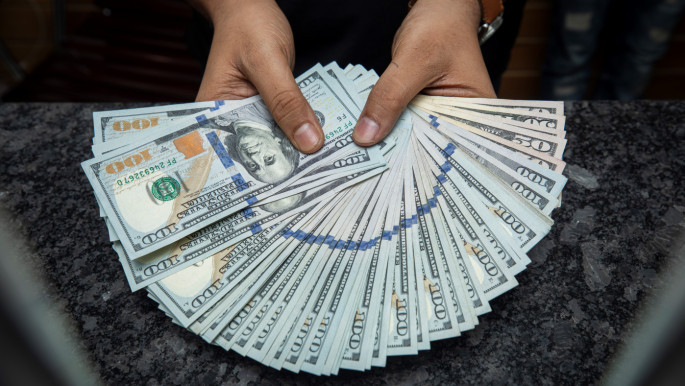The amount of cash dollars in banks is increasing
According to Bangladesh Bank data as of March 24, cash in the bank rose to $39.39 million from $32 million in February and $28 million in January.
Amid the dollar crisis, cash dollar holdings in the country's banks have started to increase. Dollar holdings continue to increase as a result of the enactment of the Offshore Banking Act, primarily to allow Bangladeshis to open and operate foreign currency accounts, as well as to facilitate dollar deposits in return for favorable returns for non-resident Bangladeshis and foreigners.
জাতীয় Read more from
বাঙ্গালহালিয়া ঈদুল ফিতর উপলক্ষে দুস্থ গরীব পরিবারকে বিনামূল্যে চাল বিতরণ
Despite BRTA's preparations, Eid road accident death toll rises by 18.75%
Mirza Fakhrul went to see Khandaker Musharraf
According to Bangladesh Bank data as of March 24, cash in the bank rose to $39.39 million from $32 million in February and $28 million in January.
Finance Minister Abul Hasan Mahmud Ali while addressing an event on Sunday (March 24) expressed satisfaction with the interest of foreign depositors and investors following the recent passage of the Offshore Banking Act.
"We expect an increase in the flow of foreign exchange soon," the minister said at the seminar titled 'Unpacking the Economic Manifesto of Awami League: Trends and Challenges for Tomorrow Bangladesh' organized at the Bangladesh Institute of Development Research (BIDS) office yesterday.
Meanwhile, bankers said, banks have started paying up to 7 percent interest on dollars deposited as RFCD (Resident Foreign Currency Deposit Account) by customers. Besides, these dollars are being spent indiscriminately at home and abroad. Several banks have announced an offer to deposit USD 10,000 in cash from this account every time they travel abroad. Because of these reasons, the bank's cash dollars are increasing now.
At present, most of the cash dollars are stored in Eastern, The City, BRAC, Dutch-Bangla, Prime, Pubali, Standard Chartered, HSBC, Islami and several other banks. Apart from US Dollars, RFCD accounts can also be opened in Pounds, Euros, Australian Dollars, Canadian Dollars, Singapore Dollars.
The head of the treasury department of a private bank told TBS, "The bank's cash dollars may increase due to discounting of RFCD accounts. Because here people can now keep up to 10,000 thousand dollars after traveling abroad without any questions. There is also a profit."
He also said that now there is no difference between the dollar rate given by the bank and the curb market. Banks are giving 114-115 rupees per dollar while getting 117-118 rupees in curb market. So those who have cash dollars are keeping them in the bank.
"However, it is not like the bank can sell it if the cash dollar increases. Because there are many people who travel abroad regularly, they may need it again after a few days, they can keep it in the student account, they can also keep it for going abroad before treatment. Go. They are not marketable to the banks. So how durable are these dollar needs to be seen first," he added.
Bangladesh Bank issued a notification from December 3 last year to provide additional facilities including interest on resident foreign currency deposits or Resident Foreign Currency Deposit (RFCD) accounts to return the dollars kept at home to the bank.
After that, some banks including The City started opening these accounts with extra initiative.
RFCD account for whom
Any Bangladeshi citizen who has come from abroad and is above 18 years of age can go to any bank and open an RFCD account.
In this case, when you traveled abroad, it is not the main thing. The main thing is that the credentials of those who have gone abroad i.e. passport and visa documents should be submitted to the bank. Two copies of photograph, nominee, National Identity Card (NID) and Tax Identification Number (TIN) are also required for account opening.
Contrary to this calculation, banks issue debit cards to customers without providing a check book, which does not require any authorization for spending.
How many dollars can be deposited?
A citizen can deposit up to $10,000 as RFCD for each trip abroad. As a result, if someone has traveled abroad 10 times in the last year, he can deposit up to 100,000 dollars without any documents.
However, if he wants to deposit more dollars in each trip, he will have to submit a customs declaration to bring more dollars into the country.
As per the central bank's new guidelines, banks are now offering up to 7 percent interest against this amount.
According to the instructions of Bangladesh Bank, the banks will give at least one and a half percent interest on the deposits with the benchmark rate.
The Secured Overnight Financing Rate (SOFOR) is now 5.31 percent. Accordingly, the interest rate as RFCD stands at 6.81 percent.
What the finance minister said
Finance Minister Abul Hasan Mahmud Ali said in Sunday's event that foreign depositors and investors are responding after the offshore banking law. Many have already contacted various parties of the government.
"Investors are saying that they have liked the laws of Bangladesh. As a result, savings from abroad will soon increase in Bangladesh, that is, the flow of foreign currency will increase in the country," he said.
The draft of the Offshore Banking Act-2024 received final approval in the cabinet meeting held on February 28. According to this law, the government will not charge any tax on the profits that foreigners keep in the offshore banking units of Bangladeshi banks. The depositor can withdraw his deposit whenever he wants. Several such benefits have been provided by the government.
The finance minister said, "At one time there were some problems. Some people started saying where is the foreign exchange? Bangladesh will become Sri Lanka. But that did not happen. Foreign exchange has started coming in."
Offshore banking has existed in the country before. But there was no law. Laws are needed for trust, for security. That is why the government made the law. People are gaining confidence. Now the campaign has started. Hopefully, investors will choose Bangladesh in the future."
The finance minister said, "Japan, South Korea, Saudi Arabia, United Arab Emirates, etc. are showing interest in investment in Middle East countries. As a result, there will be no foreign exchange crisis. Now Bangladesh is moving forward for the next step."
The finance minister said these things in the speech of the chief guest in the second session of the seminar.
The program organized at the BIDS office in Agargaon of the capital was conducted by the Director General of the organization Binayak Sen.
Meanwhile, the Prime Minister's economic adviser. Mosiur Rahman, advisor on electricity, energy and mineral resources Taufiq-e-Elahi Chowdhury Bir Bikram, advisor on education and culture. Kamal Abdul Nasser Chowdhury and other economists and researchers from various sectors were present.







